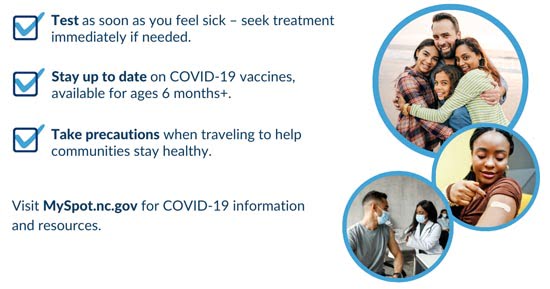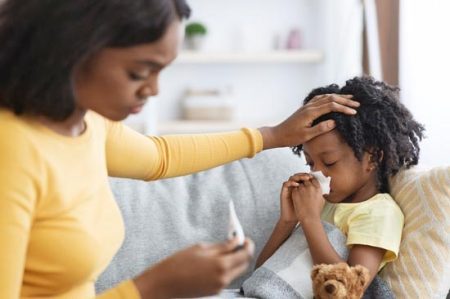Covid-19 Trends Grow Across North Carolina and Buncombe County
Flu and RSV combine to increase risk of respiratory infections.
 North Carolina and the nation have seen increases in Covid-19 metrics in recent weeks, reminding the community to take precautions for their own and other people’s health.
North Carolina and the nation have seen increases in Covid-19 metrics in recent weeks, reminding the community to take precautions for their own and other people’s health.
These increases were seen in hospital admissions, emergency department visits, and in the early warning wastewater monitoring system, which samples wastewater from select wastewater treatment plants across the state to look for SARS-CoV-2, the virus that causes Covid-19.
“We expect Covid-19 trends to rise and fall. While the public health emergency in response to Covid-19 has ended, Covid-19 is still with us and we expect it to continue to be with us,” says Dr. Elizabeth Cuervo Tilson, State Health Director and NCDHHS Chief Medical Officer. She adds that some people, including older people, people with underlying health conditions or compromised immune systems are at higher risk for severe illness with Covid-19.
“Fortunately, we have the tools for people to protect themselves and each other, including access to vaccines, testing, and treatment to help manage Covid-19 and other respiratory diseases,” she says.
Both influenza and respiratory syncytial virus (RSV) are two seasonal viruses that typically peak between December and February, but last fall they spread widely at the same time as Covid-19. These two seasonal viruses cause respiratory infections that can also cause severe illness or even death, particularly in older adults, young children, and those with underlying medical issues.
Safe and effective vaccines are the best way to protect yourself and your loved ones against Covid-19 and flu; and this year, for the first time, there is an RSV vaccine to protect people 60 years and older. There is also a new medication available to prevent RSV infection in infants.
Dr. Ellis Matheson, Buncombe County Health Director, says, “Fall is a beautiful season in our community, and we want people to be able to enjoy the colors and cooler weather while staying healthy.” She advises the community to assess their personal risk for Covid-19 and to prepare for the upcoming fall respiratory season by making sure you are up to date with all vaccines, prepare to test and treat, and stay home if you are sick.
Buncombe County encourages you to protect yourself and your loved ones by:
Staying up to date on vaccines—Catch up on Covid-19 vaccines now and get the updated booster (expected to be available by the end of September). Get the yearly flu vaccine in September or early October. The flu vaccine is available for anyone six months and older and can be administered simultaneous with the Covid-19 vaccine. Visit the BCHHS Immunization Clinic at 40 Coxe Ave. to receive vaccines, or call 250-5096 for more information.
Talk with your doctor if you are 60 years or older about whether the RSV vaccine is recommended for you.
Have a supply of Covid-19 tests, which are available for free at Buncombe County Health and Human Services at 40 Coxe Ave. in Asheville. You can also visit covid19.ncdhhs.gov/home-covid-19-tests to search for other locations near you.
Follow CDC guidelines if you test positive for Covid-19. If you have been exposed, you must continue to isolate and wear a mask.
If you test positive for Covid-19 or have symptoms of Covid-19 or the flu and are in a high-risk group, contact your healthcare provider who may prescribe medications to treat your illness. As always, wash your hands, cover your nose and mouth when you cough or sneeze, clean surfaces often, and stay home if you are sick.
Buncombe County provides a full range of vaccines for adults and children. Visit Buncombe County Immunizations Clinic at 40 Coxe Avenue downtown. Call (828) 250-5096 to make an appointment or visit during walk-in hours on Monday, Wednesday, and Friday 8-11:30 a.m. and on Tuesday and Thursday 1-4:30 p.m.
There are fees for immunizations, with some offered for free to those who qualify. Children may be eligible to receive free vaccines if they qualify for the Vaccines for Children program.








